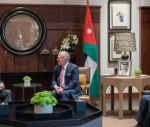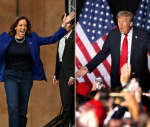You are here
Syria’s Kurdish hope
Mar 29,2014 - Last updated at Mar 29,2014
The civil war now engulfing Syria emerged from its people’s desire for political change. But the war is not universal: since the outbreak of protests in 2011 against President Bashar Assad’s regime — and long before — one group of Syrians, the Kurdish community, has consistently sought peaceful change and respect for the rights of all.
For Syria’s Kurds, the struggle against more than four decades of the Assad family’s Baathist dictatorship became particularly harsh after 2004, when security forces killed dozens of unarmed protesters in the northeastern town of Qamishli.
This ignited the spark for democratic reform, and we were spurred on by the knowledge that our kinsmen had won political autonomy in northern Iraq and were creating a vibrant democracy.
When protests erupted across Syria in 2011, Kurds were at the forefront. Unfortunately, foreign fighters across the Arab and wider Muslim world soon joined the fray, some supporting the regime, and others backing the rebels.
For the Kurds, the widening conflict meant that, in addition to fighting a brutal dictatorship, we were now confronted by Al Qaeda militants seeking to establish an Islamic emirate in the Middle East.
The Kurds have never sought to achieve democratic goals through violence. We wanted no part of a revolution that massacred children, drove families from their homes, and left millions destitute. We took up arms only to protect ourselves and our property from an immediate extreme Islamist threat that tolerated no dissent.
Radical Islamists targeted us because our people generally hold secular views of politics and society, with women, for example, playing a prominent role in public and professional life.
Islamists also abhor us because we demand self-determination, whereas they seek an amorphous emirate that lumps all Muslims together without regard for cultural and historical differences.
Indeed, they aim to suppress, and even eliminate, any such difference.
While defending ourselves, we have also established our own government in Syria’s Kurdish regions, the only areas that enjoy both order and democracy. The streets of Qamishli, Amuda and Malikiyya are calm and safe.
The armed gangs that move freely through rebel-controlled cities such as Aleppo are absent in Kurdish areas. When people go to the markets they do not fear being kidnapped or killed.
This is the case for people of all ethnic or religious communities in the Kurdish regions. Kurds have long been proud of their tolerance.
Christians who have fled rebel-controlled areas live peacefully and with equal rights in Kurdish areas. Indeed, these areas have become safe havens for all religious and ethnic groups escaping the war.
We also know that violence will not solve this conflict. That is why Syrian Kurds’ political representatives advocate a negotiated settlement, and are willing to sit down with anyone — regime or rebels — to achieve a peace agreement. Other rebel factions demand Assad’s resignation; we insist on no such preconditions.
We do not even seek the creation of an independent Kurdish state — just a guarantee of Kurdish rights in a unified Syria.
Centralised power has suppressed the country’s diversity and led to appalling abuses. Our chief goal is to end the persecution and discrimination, including the ban on the Kurdish language and our exclusion from certain professions, and we believe that this can best be achieved through a decentralised political system that devolves power to the provinces.
Yet, despite consistently demonstrating a commitment to democracy, the international community has been deaf to our appeals. The United States, Europe, and other Western governments refuse to negotiate with us, even though neighbouring Iraq and Turkey have done so willingly. The region’s new geopolitical realities demand new political arrangements.
Syria’s Kurds are ready to build a more democratic country. But we need Western support and expertise to consolidate the free society to which everyone aspires. By ignoring us, Western governments are disregarding the secular, democratic values that they claim to uphold.
Worse, our fragile democracy risks falling victim to extremists who pose a mortal danger not just to Syria, but to the wider Middle East and the world.
The writer is chairman of the Democratic Union Party of Syria. ©Project Syndicate, 2014. www.project-syndicate.org











